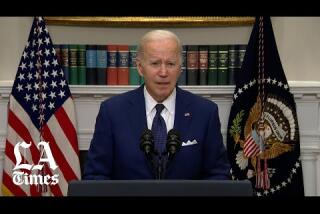Cheney urges Iraqis to settle differences
- Share via
BAGHDAD — U.S. Vice President Dick Cheney made an unannounced visit to Iraq on Wednesday to press government leaders to reconcile their political differences. His arrival occurred on a day when violence in normally placid northern Iraq killed 19 people, injured 70 and demonstrated the uncertain security situation even in sections of the country long considered relatively safe.
Cheney’s visit sparked rowdy protests in the northern Baghdad district of Kadhimiya by 1,000 supporters of militant Shiite Muslim cleric Muqtada Sadr. Some held signs reading, “Kick out the leaders of evil.”
Cheney met with Prime Minister Nouri Maliki and other senior Iraqi government officials in the high-security Green Zone.
Later in the day, an explosion rattled windows in the building where Cheney continued at work. Lea Anne McBride, Cheney’s spokeswoman, said the vice president’s “business was not disrupted. He was not moved.”
At a brief news appearance after Cheney and Maliki met, the Iraqi prime minister termed the session “positive and serious.”
Cheney said his message was that Iraqi leaders must focus “not only on the security issues but also on the political issues that are pending.”
“I do sense today a -- I think a greater awareness on the part of the Iraqi officials I talked to of the importance of their working together to resolve these issues in a timely fashion,” the vice president said.
Iraq’s parliament, however, met Wednesday without taking up any of the so-called benchmarks that the United States is counting on to unify this country’s fractious religious and political groups, including an oil law designed to boost production and share profits among Iraq’s different regions.
The vice president, who also met with the top U.S. commander in Iraq, Army Gen. David H. Petraeus, visited Baghdad as part of a larger trip to the Middle East. Cheney is expected to travel to the United Arab Emirates, Saudi Arabia, Egypt and Jordan. The Iraq stop was not announced until Cheney had departed from Washington.
The deadly bombing Wednesday in Irbil was the largest in the northern Iraqi Kurdish region, which has largely avoided the country’s civil war. The explosion targeted the Interior Ministry, which oversees Iraq’s police, and could be a sign that insurgents are taking their operations into new areas after being under fire by the ongoing American troop buildup in Baghdad and in Al Anbar and Diyala provinces.
Conflict between Kurdish Iraqis and Sunni Arab insurgents has sharpened as the result of grudges developing since the deployment of several thousand Kurdish peshmerga troops in Baghdad as part of the security plan.
In the capital city, mortar rounds, gunshots and roadside bombs claimed at least 33 lives.
Gunmen in Latifiya, a Sunni town about 20 miles south of Baghdad, opened fire on a bus arriving from the southern city of Diwaniya. Ten passengers were killed and seven injured.
In the Sunni neighborhood of Adhamiya in northeastern Baghdad, a laborer died while working on a controversial barrier designed to partition the neighborhood. He was killed when gunmen opened fire on workers erecting what the U.S. and Iraqi military have portrayed as a temporary security barrier to prevent Adhamiya’s Sunni population from clashing with Shiites in surrounding neighborhoods.
Last week, a senior U.S. Army officer was wounded by gunfire as he surveyed progress on the barrier. Local residents have denounced the structure as inhumane and say it will cage them in their neighborhood.
Also Wednesday, a car bomb exploded a few hundred feet from an Iraqi army checkpoint on a busy northern Baghdad street, killing one person and damaging nearby shops and cars.
Shiite death squads were blamed for 21 unidentified bodies found dumped on Baghdad streets, all of them riddled with bullets. Army Maj. Gen. William B. Caldwell IV, a military spokesman, acknowledged that the number of such killings has risen in recent days even as U.S. and Iraqi security forces increase their numbers in the city’s neighborhoods. But he said the increase was “slight” and that the security plan is a work in progress.
Also Wednesday, the U.S. military announced the death of a soldier the day before in Diyala province, a Sunni insurgent stronghold east of Baghdad. According to icasualties.org, 3,381 U.S. troops have died in the Iraq theater since the 2003 American-led invasion.
Two Iraqis were killed in Musayyib, about 35 miles south of Baghdad, when a bomb exploded in front of a shop. Two more Iraqis died when mortar rounds crashed into a neighborhood in Haswa, 30 miles south of the capital.
*
Special correspondent Abdulsalam Madani in Irbil and special correspondents in Baghdad contributed to this report.
More to Read
Sign up for Essential California
The most important California stories and recommendations in your inbox every morning.
You may occasionally receive promotional content from the Los Angeles Times.














